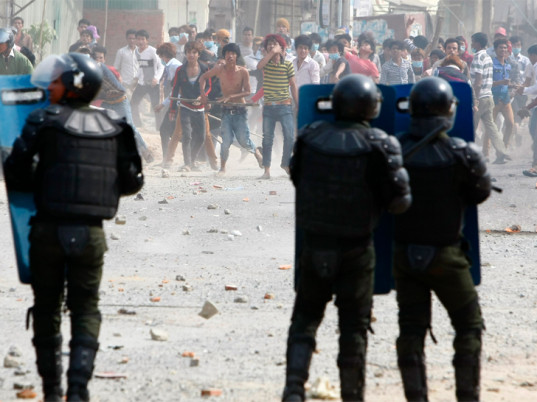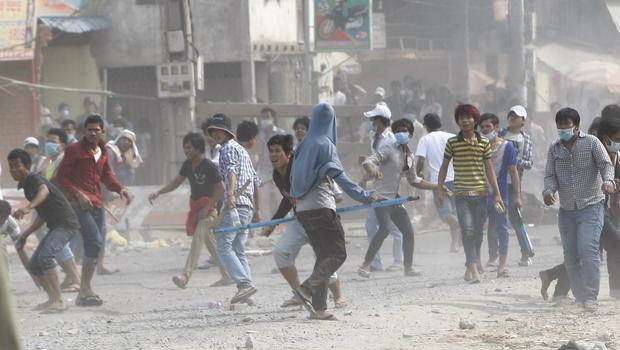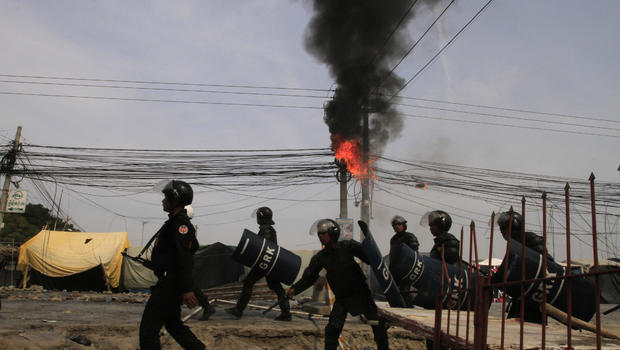
Cambodia garment workers throw stones at riot police during a strike near a factory on the outskirts of Phnom Penh, Cambodia, Jan. 3, 2014 AP/HENG SINITH
PHNOM PENH, Cambodia – At least four people were killed Friday when police outside Cambodia’s capital opened fire to break up a protest by striking garment workers demanding a doubling of the minimum wage, police and human rights workers said.
Chuon Narin, deputy chief of the Phnom Penh Municipal Police, said the four were killed and about 20 others wounded in a southern suburb of the capital after several hundred workers blocking a road began burning tires and throwing objects at police officers. Witnesses said some officers fired AK-47 rifles into the air and that others shot at ground level.
Workers at most of Cambodia’s more than 500 garment factories are on strike, demanding an increase in the minimum wage to $160 a month, double the current rate. The government has offered $100 a month.
The local human rights group LICADHO said in a statement that at least four civilians were shot dead and 21 injured in what it described as “the worst state violence against civilians to hitCambodia in 15 years.”The statement said that security forces used live ammunition to shoot directly at civilians.

Belgian photographer John Wink stands to get a close look at the body of a man lying dead on the ground after riot police opened fire on garment workers on strike Jan. 3, 2014 AP/HENG SINITH
|
“The use of live ammunition was prolonged and no efforts appear to have been made to prevent death and serious injury,” it said. “Reports suggest that security forces were also injured after being hit with stones.”
It was not clear whether those killed were workers or local residents who had joined in the protest.
“They are anarchists, they have destroyed private and state property,” Chuon Narin, the deputy police chief, said by phone. “That is why our forces need to chase them out.”
The protesters were cleared from the street, at least temporarily, by early afternoon.
The violence comes at a time of political stress in the country, with the opposition Cambodia National Rescue Party holding daily protests calling for Prime Minister Hun Sen to step down and call elections. |
Hun Sen won elections last July that extended his 28-year rule in the poor Southeast Asian nation, but opposition protesters accuse him of rigging the vote. Hun Sen has rejected their demand.
Although the wage and election issues are not directly linked, the opposition has close ties with the country’s labor movement. Last Sunday, many workers joined a massive political rally organized by the opposition.
The workers represent a potent political force, because the garment industry is Cambodia’s biggest export earner, employing about 500,000 people. In 2012, Cambodia shipped more than $4 billion worth of products to the United States and Europe.

Cambodia garment workers throw stones at riot police during a strike near a factory on the outskirts of Phnom Penh, Cambodia, Jan. 3, 2014 AP/HENG SINITH
The site of Friday’s clash – a street with stores and dwellings – was strewn with debris. Walls bore holes apparently caused by bullets.
Mak Vin, a 25-year-old worker, said he was among those protesting for more than a week over the wage issue. He said that on Friday morning, as the workers burned car tires and shouted slogans, “hundreds” of armed police arrived and opened fire.
“They fired live bullets directly at us. I am very scared,” Mak Vin said.
There had been an earlier clash overnight, with no known fatalities.
Mak Vin said the workers were protesting only for higher wages, and would return to work once that demand was met. He said most workers were not cowed by the shooting, and would continue their strike.

Cambodian riot polices walk past an electric wire burned prepare to blockade garment workers on strike near a factory of Canadia Center, Jan. 3, 2014 HENG SINITH, AP
One measure of the seriousness of the situation was an unusual statement issued by the Defense Ministry affirming the military’s loyalty to the government. The statement said the army would take whatever action was necessary to defend the legal government, the king and the constitution.Friday’s confrontation followed a similar one a day earlier at a different location, in which elite troops broke up a demonstration outside a factory, beating demonstrators and arresting 10 people, including Buddhist monks, according to witnesses from human rights groups.
Violent suppression of social and political protests has not been unusual under Hun Sen’s authoritarian government, but there have been few incidents in recent years where more than one person has been killed.
The authorities also usually shy away from using live ammunition in Phnom Penh, where the population is largely hostile to the government.
But the U.N. special rapporteur on human rights in Cambodia, Surya Subedi, said it was the third time since the disputed elections that authorities have shot into a crowd and caused fatalities. He called for an independent investigation into whether excessive force was used. He also expressed concerned about increasing violence by some demonstrators.
The standoff over wages presents Hun Sen with a dilemma, as increasing violence could drive the workers into a tighter alliance with the opposition, providing a vast pool of people for their increasingly confident street demonstrations. But the government is also close to the factory owners, whose exports fuel the economy and who are generally seen as financial supporters of Hun Sen’s ruling Cambodian People’s Party.
Last week, violence erupts in Cambodia when the Garment Manufacturers Association in called for factory owners to close their plants, ostensibly for fear of damage by protesters. The situation puts pressure both on the striking workers, who are not being paid, and the government, which relies on garment exports to power the economy.
20 Years Later, NAFTA Still a Massive Fail
in Jobs/by MAM TeamMore than 845,000 specific U.S. workers have been certified for Trade Adjustment Assistance (TAA) as having lost their jobs due to imports from Canada and Mexico or the relocation of factories to those countries. The TAA program is quite narrow, only covering a subset of the jobs lost at manufacturing facilities, and is difficult to qualify for. Thus, the NAFTA TAA numbers significantly undercount NAFTA job loss.
Made in America Expo
in American Made/by MAM Teamamerican made products
For the public attending the Expo, they will be able to go from booth to booth of all American made goods. Consumers want to support American made products because of the benefits to keeping dollars on our own shores and strengthening our production jobs base.
National speakers and well known advocates of The Made in America Movement, including our very own, Ms. Margarita Mendoza, CEO & Founder, will discuss the importance and advantages to buying American made products. If you are in the area, stop and say hi! Enter the raffle for a major American made prize, such as a Ford automobile. Yo, will be given away to attract regional consumers.
Well known Dallas/Fort Worth meteorologist and TV personality Rebecca Miller will serve as the emcee of the Made in America Expo.
Expo Management, Inc.’s mission is to showcase a wide variety of domestic companies that produce American made products in an expansive, equitable expo venue that will attract large numbers of willing consumers.
Become an exhibitor today.
MAM Members, contact your member services rep for your discounted rates. Click here to view a complete prospectus.
See you in Fort Worth!
Fashion & Beauty Editor Tabitha St. Bernard Joins The Made in America Movement Team
in Interviews/by MAM TeamFacebook: Tabii Just
Pinterest: TabiiJust
Twitter: @TabiiJust
Act Now: Dangerous Fast Track Bill Filed January 9th.
in Government/by MAM TeamWe asked for legislation to neutralize foreign currency manipulation. They said no.
We asked for comprehensive tax reform to the double taxation of our exports through foreign border adjustable consumption taxes. They said no.
Instead, they file the Fast Track (so-called “Trade Promotion Authority”) bill to these global governance deals like the TransPacific Partnership (TPP) through Congress without any amendment or sufficient debate.
They admit they can’t pass TPP under regular procedural rules because it is so controversial… so they change the rules!
Over 170 members of Congress from both parties, last November, said they opposed Fast Track because it is constitutionally wrong and because it produces bad trade policy.
Tell Congress to oppose Fast Track and support debate under the Regular Order… the ordinary rules of debate and procedures given to every other bill before the House and Senate.
We cannot reform trade policy to grow our economy, create jobs, and protect our constitutional republic unless we stop Fast Track now.
If we get it wrong, the trade deficits will continue eroding the American dream.
We can win this. Tell Congress to oppose Fast Track to keep its power over trade treaties while protecting our sovereignty.
Sincerely,
Michael Stumo, CEO
Coalition for a Prosperous America
Video: What is TPP and Fast Track?
in Jobs/by MAM TeamTell Congress to Stop FAST TRACK on TPP
in Jobs/by MAM TeamHave You Heard of the TPP Yet? An Important Trade Agreement You Need to Know About
in Government, Jobs/by MAM TeamTrade is relevant. The U.S. trade deficit, which has grown from a little more than $70 billion in 1993, the year before NAFTA went into effect, to nearly $540 billion today, costs us jobs. Trade deficits represent lost opportunities. The bigger the trade deficit, the more jobs we could have created in the United States but didn’t. Moreover, trade agreements affect our domestic laws. Once we enter into a trade agreement, it’s not so easy to raise tariffs on trading partners that engage in egregious human rights violations—nor is it easy to exit the agreement once we find out it is bad for our economy and our job creation.
Trade also is interesting. Trade rules affect your rights in the workplace, the safety of the food you eat and how clean your water is. Trade rules can affect whether tuna canneries are allowed to tell you if your tuna is dolphin-safe or whether local grocery stores have to label the hamburger you buy with its country of origin. Trade rules can affect the price of the fancy imported cheese you like or how much North American content must be in an automobile for it to qualify for the tariff benefits of NAFTA. And trade rules also can make it easier for an employer to shut down a factory, call center or legal support office and move it overseas. Trade is anything but boring.
And the debate is certainly not over. The proposed TPP is not yet finished—the rules are still being written. Will those rules largely mimic the rules that have helped kill off nearly 6 million manufacturing jobs in the United States in just over a decade? On the other hand, will the rules help make it easier for our brothers and sisters overseas to organize and act collectively to improve their wages and working conditions? Will the rules require our trading partners to protect endangered species? Or will they make it easier for giant global corporations to attack laws banning toxic chemicals? We don’t know the answer to these questions yet—because the deal isn’t done. But if the loudest voices the administration and Congress hear belong to the global corporations who have benefited from past agreements, I can predict what the answers will be. And they won’t be answers we like. If you have not yet spoken up to tell President Obama that America can’t take another NAFTA, now is the time. The president wants to finish negotiating the agreement by October 2013. Tomorrow may be too late.
Japan's Suntory Gulps Down U.S. Spirits Maker Beam
in Products/by MAM TeamViolence Erupts in Cambodia as Labor Dispute Intensifies
in Economy, Government/by MAM TeamWorkers at most of Cambodia’s more than 500 garment factories are on strike, demanding an increase in the minimum wage to $160 a month, double the current rate. The government has offered $100 a month.
The local human rights group LICADHO said in a statement that at least four civilians were shot dead and 21 injured in what it described as “the worst state violence against civilians to hitCambodia in 15 years.”The statement said that security forces used live ammunition to shoot directly at civilians.
It was not clear whether those killed were workers or local residents who had joined in the protest.
“They are anarchists, they have destroyed private and state property,” Chuon Narin, the deputy police chief, said by phone. “That is why our forces need to chase them out.”
The protesters were cleared from the street, at least temporarily, by early afternoon.
The violence comes at a time of political stress in the country, with the opposition Cambodia National Rescue Party holding daily protests calling for Prime Minister Hun Sen to step down and call elections.
Although the wage and election issues are not directly linked, the opposition has close ties with the country’s labor movement. Last Sunday, many workers joined a massive political rally organized by the opposition.
The workers represent a potent political force, because the garment industry is Cambodia’s biggest export earner, employing about 500,000 people. In 2012, Cambodia shipped more than $4 billion worth of products to the United States and Europe.
Mak Vin, a 25-year-old worker, said he was among those protesting for more than a week over the wage issue. He said that on Friday morning, as the workers burned car tires and shouted slogans, “hundreds” of armed police arrived and opened fire.
“They fired live bullets directly at us. I am very scared,” Mak Vin said.
There had been an earlier clash overnight, with no known fatalities.
Mak Vin said the workers were protesting only for higher wages, and would return to work once that demand was met. He said most workers were not cowed by the shooting, and would continue their strike.
Violent suppression of social and political protests has not been unusual under Hun Sen’s authoritarian government, but there have been few incidents in recent years where more than one person has been killed.
The authorities also usually shy away from using live ammunition in Phnom Penh, where the population is largely hostile to the government.
But the U.N. special rapporteur on human rights in Cambodia, Surya Subedi, said it was the third time since the disputed elections that authorities have shot into a crowd and caused fatalities. He called for an independent investigation into whether excessive force was used. He also expressed concerned about increasing violence by some demonstrators.
The standoff over wages presents Hun Sen with a dilemma, as increasing violence could drive the workers into a tighter alliance with the opposition, providing a vast pool of people for their increasingly confident street demonstrations. But the government is also close to the factory owners, whose exports fuel the economy and who are generally seen as financial supporters of Hun Sen’s ruling Cambodian People’s Party.
Last week, violence erupts in Cambodia when the Garment Manufacturers Association in called for factory owners to close their plants, ostensibly for fear of damage by protesters. The situation puts pressure both on the striking workers, who are not being paid, and the government, which relies on garment exports to power the economy.
White House To Announce Manufacturing Hubs
in Government/by MAM Teammade in america
While the President originally touted the initiative in his 2013 State of the Union address last February, Thursday’s event will be the first official launch of the program… White House To Announce Manufacturing Hubs.
Those areas, White House officials say, are among the top 20 places most adversely affected by the recession. Each neighborhood or area in the “Promise Zone” has laid out specific goals and will be held accountable by program administrators and third-party experts to track their results.
In San Antonio, Mayor Julian Castro has been applauded by the White House for his efforts to work with federal programs and investments from local businesses to revitalize neighborhoods. The Eastside area of the city has partnered with St. Philip’s College for job training programs in energy, healthcare, and aerospace/advanced manufacturing jobs, among other initiatives.
“Investing in and rebuilding hard-hit communities are important parts of the President’s plan to restore the basic bargain at the heart of the American story – that every child should have a fair chance at success. And that, no matter who you are or where you’re from, if you’re willing to work hard and play by the rules, you should be able to find a good job, feel secure in your community, and support a family,” a White House official said about tomorrow’s event.
The White House has cited the Youngstown, Ohio area as an example of success as a “manufacturing innovation institute” which has turned around a once-shuttered manufacturing warehouse into a thriving 3-D printing center. In 2012, President Obama announced his plan to invest $1 billion in a network of up to 15 similar cities.